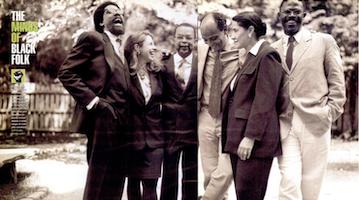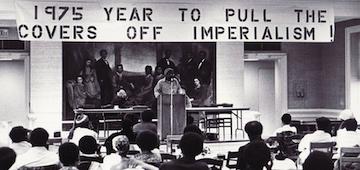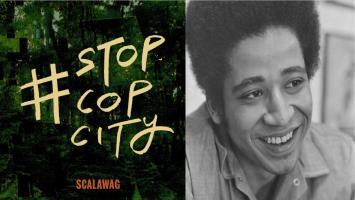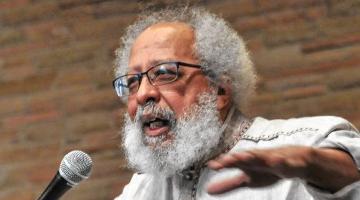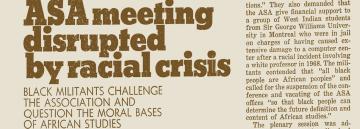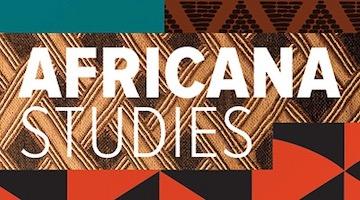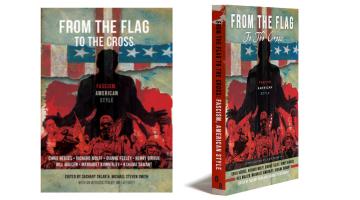As part of the Black Agenda Report Book Forum, we interview scholars about a recent article they’ve written for either an academic journal or popular publication. We ask these scholars to discuss their article, as well as some of the books that have most influenced them.
This week’s featured scholar is Tyrone S. Palmer. Palmer is a Lecturer in the Department of African American and African Diaspora Studies at Columbia University. He is also a Fellow in the Society of Fellows and Heyman Center for the Humanities at Columbia University. His article is “Otherwise than Blackness: Feeling, World, Sublimation.”
In your essay, you cite Aimé Césaire’s call for “the end of the world.” How does this commitment to the end of the world connect to the larger struggle for Black liberation?
The struggle for Black liberation, for me, is inextricable from the desire for the End of the World in all of its guises and manifestations. As such, Césaire’s call for the “end of the world” in his Notebook of a Return to My Native Land perfectly encapsulates an impulse and demand that ran throughout the anti-colonial struggles of the time in which he was writing; he provided language that captured a pervasive structure of feeling. This structure of feeling is endemic to a tradition of Black thought and political organizing, which sees as its aim the destruction of the World as an anti-Black structure of containment. This is why I think this phrase has been returned to again and again in the wake of its initial pronouncement—perhaps most notably by Frantz Fanon and Frank B. Wilderson III, but in the contemporary context, in the work of a wide range of thinkers, artists, and organizers.
Yet in the face of the omnipresence of “the End of the World” as a political mantra and organizing concept (alongside related phrases, such as Sun Ra’s “it’s after the end of the world, don’t you know that yet?”), I found myself wondering if the ideas undergirding it had been, in some instances, drained of their urgency; if “the end of the World,” by virtue of being so readily invoked, had become meaningless. At the very least, it became clear to me that “the End of the World” means very different things to different people, and that serious ideological and political differences were being obfuscated by the phrase’s widespread, and often decontextualized, usage. So, this essay was in part motivated by the need to clarify the stakes of the phrase for myself, beyond a kind of sloganeering that happens when complex arguments are distilled and dispersed into social media soundbites.
It’s common among activists, artists, and academics to speak of “worldmaking” and “worldbuilding”. Your article challenges us to see the language and process of “worlding” as an anti-Black language and process. Can you share a little more about this, especially as to how it simultaneously challenges discourses around “otherwise possibility”?
So, related to the aforementioned confusion about what “the end of the World” means is a lack of clarity about what “the World” itself is. I think the end of the world is often taken to mean the end of this particular world, to be replaced with a new one that, ostensibly, will not carry the traces of the antagonisms that plague the World in its current formation. What I argue is that this takes for granted that the World can be divorced from its articulation as an anti-Black structure of containment and regulative idea. This is why I look to the conceptual history of the world as the grounding term of metaphysics. I think it is fairly uncontroversial at this point, thankfully, to state that “the world is anti-Black,” but I also want to insist that any possible world will be anti-Black, because the desire for, and function of, the world and its reproductive logic of worlding is anti-black, and necessitates anti-black violence for its cohesion as a world. Much like the human, in my estimation, cannot be redeemed or re-enchanted, the World cannot be redeemed, even through a multiplicity of worlds.
The consistent call for worldmaking and worldbuilding, then, is misguided, and often functions to reify the very structures we are purportedly trying to get rid of, in the guise of reinvention or an “otherwise possibility.” The insistent invocation of the otherwise—always possible, deferred, on the horizon—is, in my estimation, rather insidious. We can see this in the popular slogan “another world is possible,” which functions as a rallying call for many leftist political formations. I am curious about the logic inherent in this statement, and whether we are aware of what we are calling for in its adoption and diffusion—is the desire for the end of the world necessarily a desire for another world? And what changes if we think through how the always present possibility of another world is perhaps a part of the issue at hand—that the world’s dominative logic is, in fact, dependent on its continual reinvention (through and as progress, reform, etc.), as “worlding”? How might we, in fact, be held captive to possibility and, subsequently, perpetual struggle and deferred gratification?
Black studies, as a field, seems utterly seduced by the promise of otherwise worlds, willed into existence through the imagination, aesthetic creation, performance, interminable struggle, etc. But while the focus of my critique in the article is the logic of “the otherwise,” that is really a stand in for what seems to me to be an endless parade of terms that serve the same function. I have noticed that every year there appears to be a new buzzword—fugitivity, refusal, poesis, affect, etc. and so on—that appears to stand in for a certain transcendental desire. Perhaps this is just the way academic concepts and the industry surrounding them work—the exhaustion of a term yields more neologisms in its place. Either way, what these terms have in common, as I articulate in my critique of the logic of the otherwise, is their deployment as a mode of sublimation of the negativity of Blackness. They also signal a means of turning away from the perceived enclosure of antagonism toward an elsewhere, vaguely defined but fervently conjured. I am much more interested in thinking with the enclosure, the impasse, the abyss, the void, rather than prematurely fashioning a theoretical escape from it.
So, one of the main things I hope people take away from this article is that we should question our investments in the notion of the World, as well as our stated desires for otherwise worlds. What other modes of thinking (anti-)social formations are there outside of this concept and its logic of containment?
You cite the work of Calvin Warren and David Marriott throughout your article. How do these two theorists inform your argument around affect, worlding, and anti-Blackness? I’m thinking specifically of Marriott’s reading of Fanon, and the significance of invention and the abyssal in his latest writings.
Both Warren and Marriott have been instrumental in the trajectory my work has taken, and I find myself visiting both of their writings quite often. Both of them are crucial because they provide language for thinking with and through Blackness even as, in their theorizations, it evades the very capacities of language to fully articulate or grasp. I see them both, in that sense, as theorists of impossibility. They have also been instrumental, alongside Jared Sexton, Selamawit Terrefe, and others, in clarifying for me the relationship between Blackness and psychoanalysis, and the insights that a psychoanalytic perspective and approach can bring to bear on the fundamental questions concerning the Black position and its attendant aporias.
What I appreciate most about Warren is the force of his language. He has a way of stating things that gets directly to the heart of the matter, unflinchingly. For my argument in this article, I pull from his work in Ontological Terror wherein he argues, through his reading of Heidegger, that the Negro is the figure par excellence of worldlessness—situated as without capacity for world or “world-forming.” This rendering of worlding as a capacity, rather than a given reality or universal structure, is an essential point that reinforces one of the main contentions of the article—that the World is taken for granted and assumed as a priori, and that it is necessary to think beyond it as ground or political horizon. In terms of the question of affect, there is a difference in our conclusions regarding its utility (I’m thinking of his essay “Black Care,”—which I do not cite in this particular article, but which I have taught and engaged in other contexts—where he argues for a certain embrace of affect as expressivity and “testimony,” as a means of articulating the interminability Black suffering), but I do find that difference productive.
Marriott’s readings of Fanon, not only in Whither Fanon? but throughout his oeuvre, are a model for how to rigorously sit with another thinker’s work and read in a way that pushes forward rather than merely providing commentary. He exemplifies a mode of reading and critical engagement that works against and through the limits inherent in any given text. As far as his importance for the argument I am making in this article, you are right to point to his notion of the abyssal and, particularly, his elaboration of the concept of n’est pas. These are ideas of his that I am very much still trying to grapple with, but in the article, I read the n’est pas as signaling an unbridled negativity, an abyssal limit, which moves us away from the pretense that we can actually know what Blackness ‘is’ and therefore represent it. It is this undecidability of Blackness and its rupturing negativity that I argue is the source of a certain anxiety, and that we are often called to move beyond in favor of a positive articulation of Blackness as possibility or potential.
I know a lot of BAR readers are indebted to the important work of Anarkata. I even noticed you assign their statement in one of your courses. I’m curious how you see your work fitting into the larger tradition of Black anarchism.
I would not characterize my work or political orientation as Black anarchist, particularly because I think that designation entails commitment to a tradition of thought and organizing work that I am not versed in or materially devoted to. I think it is quite irresponsible and, frankly, counter-insurgent when a political tradition is divorced from its historical and material grounding and invoked as a signifier of a supposed spirit or sensibility of ‘radicalism,’ which I have noticed happening a lot recently with Black anarchism in particular. That being said, there are a lot of resonances between Black anarchist thinkers and my own preoccupations. Part of my reason for assigning Anarkata’s statement in that class, as well as Lorenzo Kom’boa Ervin’s Anarchism and the Black Revolution, was to get my students to see even more clearly that the questions that we had been concerned with throughout the semester, mostly at a certain theoretical level of abstraction, are in fact being worked through and engaged with “on the ground” as it were, and that while there is a vital political utility to the theoretical work we were undertaking together, that isn’t the full extent of the work that needs to be done. Specifically, Anarkata’s stated investment in non-hierarchical political formations (and their notion that hierarchy of any form is constitutively anti-black—that hierarchy is captivity), is very instructive. So, I would say the connection is there in terms of a certain way of approaching questions of Black liberation, their anti-humanism, and a desire for end of the world—a recognition of the necessity of its destruction as a motivating factor for revolutionary action.
A lot of organizers, artists, and academics can often point to books that helped radicalize them. Are there any books that radicalized you? How so?
Well, as I gestured toward in my answer to the previous question, I am a very skeptical of the academic tendency to self-stylize (and self-market) as “radical.” Rather than thinking of myself as radicalized at a particular point in time, I prefer to think of it as a continual process. I hope that my work can be used toward radical ends, but am not so presumptuous as to say that my work is radical in itself. That being said, there are a few texts that have certainly radically re-oriented my thinking, and have set me on the path that I am on now, either by opening up a lot of questions, deeply changeling my presuppositions, or putting language to problems that I had been trying to contend with. The first one that comes to mind is a book I encountered during my undergrad years at Brooklyn College in a course called “Black Liberation Struggles,”—Racism: From Slavery to Advanced Capitalism by Carter A. Wilson. This was one of the first texts I read that thought about racism beyond the experiential and incidental, and offered instead a structural, historical materialist analysis of racist ideology. From what I remember, the book tracks the emergence and evolution of racism in North America as tied to shifts in the dominant mode of production. Rather than naming racism as a singular or static mode of discrimination, it shows how racism continually evolves over time to fit the (ideological) needs of the political and economic apparatus. So, the form of racism in the context of industrial capitalism is distinct from the form of racism in the context of plantation slavery. It also argues that racism’s evolution over time necessitated the emergence of different personality types and psychosocial dynamics—linking a materialist theory of race and racism to libidinal questions of affect and desire (though not stated in this way). I haven’t revisited that book in a very long time, and I am certain that I would have a number of critiques and disagreements with it if I did, but at the time it was a very formative text for me–it was my engagement with that text, and the professor of that course, that was instrumental in convincing me to pursue graduate school.
Reading Frank B. Wilderson III’s Red, White and Black: Cinema and the Structures of US Antagonisms during my first semester of grad school completely shifted my thinking as well, as it was the first time I had encountered a theoretical text that put language to the quandaries of inhabiting an anti-Black world so succinctly. I know many who were, and are, scandalized by Wilderson’s book and his rhetoric—but for me, reading it for the first time, I was struck by a profound sense of recognition. It recognizes, rather than obscures, with an at times startling clarity the nature of the problem posed by Blackness and for Black existence in the world. It makes clear the scope and scale of anti-Blackness, not as a variation of racism or social oppression, but as the threshold through which all political, ethical, and philosophical questions can be articulated. The controversy and vitriol with which it is often met truly baffled me at first, because, to me, much of what he is arguing seems obvious to anyone who has lived as a sentient Black person in the world. So many of the points he raises are mirrored by sentiments that I have encountered and have been expressed and held by many Black people far outside of the walls of academia. But after reflecting, I think a part of the reaction that many in “the field” have to Afropessism is the shock of recognition, and the drive to turn away from what they recognize all too well as an impossible truth. This aversion is what I am getting at in the article when I talk about the sublimation of Black affect—the negativity that Blackness holds is often too much for even us to bear, and must therefore be made into something generative and productive—an elsewhere or an otherwise.
Which two books published in the last five years would you recommend to BAR readers? How do you envision engaging these works in your future scholarship?
This may be a somewhat obvious one, but I have to say: Zakiyyah Iman Jackson’s Becoming Human: Matter and Meaning in an Antiblack World. I know your readers are familiar with this book since Jackson did an excellent interview with you about it, so I won’t rehearse her argument here. But I will say that I think her methodological innovations are especially essential and an underappreciated aspect of her work. Jackson’s philosophical readings of Black literature and visual culture are truly revelatory, and has been a model for me as I work on my own book manuscript. There are so many field shifting insights in her text—from her insistence on humanization as a form of violence in itself, to the notion of ontologized plasticity and its distinction from theories of Blackness’ fungibility, to the sexuating nature of anti-Blackness. It is a book that deeply deserves serious engagement, and one that I look forward to spending a lot more time with.
There are many other books I could name, but because the article we’re discussing here is on the question of the World and “worlding,” another text I would recommend along those lines is Roland Végsö’s Wordlessness after Heidegger: Phenomenology, Psychoanalysis, Deconstruction. I came to this text well after I wrote “Otherwise than Blackness,” but as I continue to think through the problems and questions posed in that article, this book has been very helpful. It really draws out the philosophical implications of worldlessness and how the concept is related to notions of relation, freedom, etc.
As an added bonus, recently I have been reading David Lloyd’s Under Representation: The Racial Regime of Aesthetics, which offers a really astute criticism and explication of the racial logics of aesthetic philosophy. Another current project of mine is very interested in troubling the hegemonic modes of engaging and imagining the aesthetic, particularly in the fields of Black performance theory and Black cultural studies, and I am finding this text quite useful as I think through the problems with and limitations of a certain affirmationist reading of the aesthetic’s form and function in Black life.
Roberto Sirvent is editor of the Black Agenda Report Book Forum.

